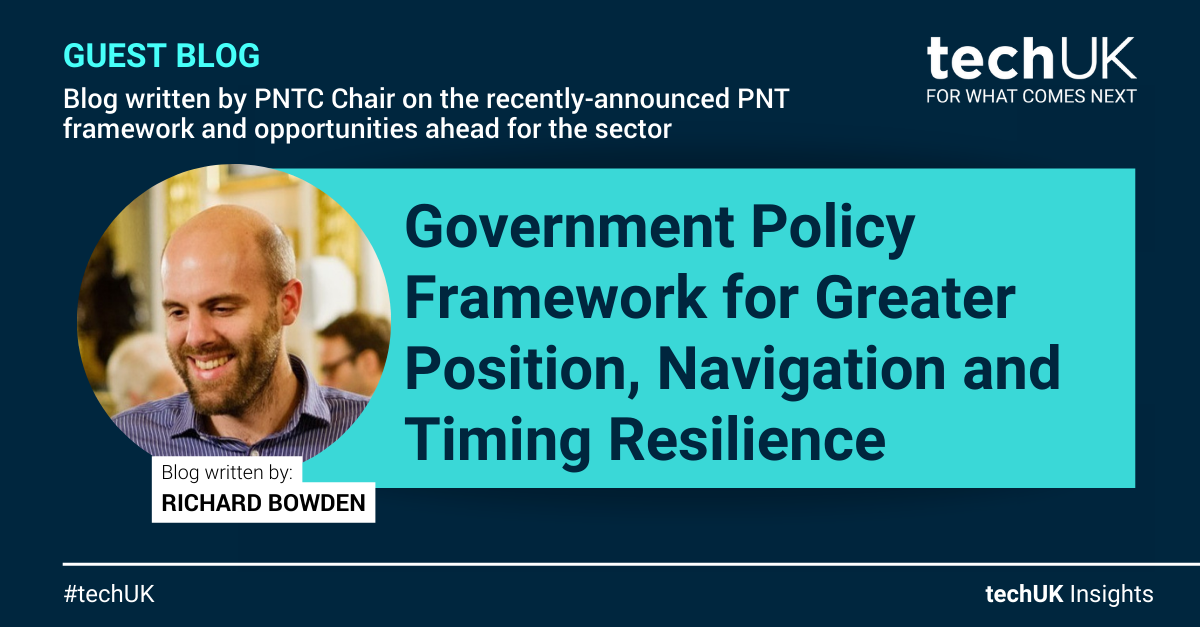PNTC Chairman's blog: Government policy framework for greater position, navigation and timing resilience

On 18th October, George Freeman MP (then Minister for Science, Research and Innovation) published the UK Government Policy Framework for Greater Position, Navigation and Timing (PNT) Resilience.1 The framework sets out the key points in the UK Government’s plan to reduce the risks to the nation that result from the universal reliance on PNT, and in particular satellite navigation.
Increasing the resilience of the PNT services on which the UK relies was a commitment in the 2021 Integrated Review “Global Britain in a Competitive Age”, but the origins of this framework go back well before that. In 2018, the UK Government published “Satellite-derived Time and Position: A Study of Critical Dependencies”2, fondly referred to as the Blackett Report, which laid bare the risk that UK was exposed to. Before that, in 2017, London Economics, commissioned by InnovateUK, published its report on the “Economic Impact To The UK Of A Disruption to GNSS”3 which put the economic value risk in the UK as a result of an outage of GNSS (the generic term for satellite navigation systems, of which GPS is the most famous) at around £1 Billion per day. And, of course, the sector has been warning of the risks regularly for over 20 years, all the way back to the Volpe report in 20014. This framework has been a long time coming!
With that in mind, it will come as no surprise that the publication of the PNT Policy Framework with its 10 point plan is universally welcomed across the PNT sector. That doesn’t mean that the job is done, of course, and now comes the harder task of putting it into action. But to have a framework at all is a huge step forward, and puts the UK on the front foot on what is a global problem, and a global opportunity.
So, as the Chairman of the joint techUK and UKspace Position, Navigation, and Timing Committee – here are a few personal thoughts on the framework:
- National PNT Office – This is arguably the biggest step forward. PNT is transversal, embedded into every department of Government and almost every facet of life. To have a single office which will coordinate policy and action across the board should be transformative. The PNT Office has a mammoth task ahead with only a small team, and it is my hope that we can work together in partnership as a sector to achieve the framework’s goals effectively and efficiently.
- Technology and Solutions – PNT is data, it’s just information about points in space and time, and it’s derived, transmitted, processed, and stored with technology. Whether it’s GPS, an atomic clock, or a sextant, technology is everywhere in PNT. The future of assuring PNT, achieving resilience for services and users, and improving accuracy and availability for all (indoor and underground positioning anyone?) is in combining different technologies (with different performance and failure modes) with modern security and service delivery principles. The framework identifies several different areas of technology that need to be developed in order to secure, complement, and reduce our dependency on GNSS: a National Timing Centre, eLORAN, Space Based Augmentation, robust receivers, clocks, quantum sensors. UK industry has been at the forefront of PNT technology for centuries, and this commitment by the Government means that we will continue to be in the future.
- PNT Crisis Plan – If the events of the last few years have taught us nothing else, it’s that you can’t hide forever; sooner or later risks will be realised, and it’s better to be prepared. The preparation of a PNT Crisis Plan is a vital step – it doesn’t matter how much amazing technology you throw at a problem, eventually it will fail. Whether it’s understand the risk, monitoring for issues, alerting users quickly, diagnosing the cause, training for mitigation and backup strategies, or recovering PNT services, the PNT Crisis Plan should ensure that we limit the damage when it happens. It’s going to require close coordination between Government and the sector.
- PNT Skills – Like so many STEM areas, PNT skills are in critically short supply. The technical and growth ambition can only be realised if we have the people and skills to deliver it. We are constantly losing brilliant people to other sectors, and we aren’t attracting enough new talent. To develop new skills, we need more PNT courses, doctoral training and research, awareness in adjacent sectors (IT, cyber, AI, autonomy, quantum, sensors), and skills transfer. And to retain the people we have, we need interesting long-term programmes involving innovation and opportunity for growth, and recognition that we are making a difference.
- Growth Policy – The global PNT market is huge, satellite navigation products and services alone will hit £400 billion per year by 2031 according to EUSPA5. Add to that the non-GNSS and the enabled economy (everything from autonomy to 5G, global logistics to precision farming), and the opportunities are vast. Accuracy to accurate assured PNT is high on the global wish list and this framework will give UK industry the tools to invest in and develop world-class PNT products, as well as everything that uses it.
The PNT Policy Framework is a big step forward. Since the publication, we have a new Minister for Science, Research and Innovation, Andrew Griffith MP. I have written to him to express our appreciation to his government for putting the framework in place, and to push him and his team in the National PNT Office to move forward with pace, momentum, and in collaboration with the sector. This is just the beginning.

Join us in the Joint techUK/UKspace Positioning, Navigation and Timing Committee Dec Meeting. The committee is a cross industry group that focusses on the technology, regulatory and policy issues related to the current and future global PNT roadmap. Click here to register for your ticket.


